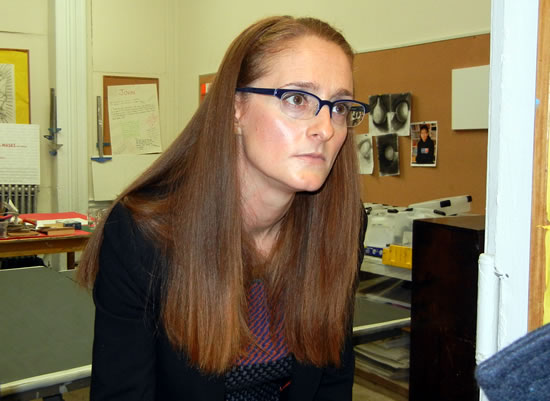Lawyers, Parents & Special Needs Students: Finding the Proper Placement
By Danielle M. Bennett, M.A.

Michelle Siegel, attorney
Recently, an overflow audience of 55 eager parents of adolescents and children receiving and/or seeking special services gathered at the Robert Louis Stevenson School, a private college preparatory school in on the Upper West Side.
At the meeting, conducted by special education attorneys, Adam Dayan and Michelle Siegel and organized by Dr. Matthew Mandelbaum, Stevenson’s Director of Outreach, parents learned about their rights and privileges in securing the appropriate and least restrictive educational placement for their children as well as obtaining funding with the support of a lawyer/advocate. A paper trail is very important emphasized the attorneys, for example, keeping letters that summarize the action of the district. Parents have to be aware of their rights and obligations that will help them find the best place for their child. Sometimes, the jargon used by the Department of Education is very confusing for parents. How do you request an evaluation? If your child is not functioning, not participating in class, you can request an evaluation. Once the parent has signed informed consent, he or she has sixty days in which to take action. When you are giving signed consent, you essentially are giving the Department of Education permission to go in and observe your child. The interest in the audience was high and the range of questions could have gone on for another hour. The attorneys and Dr. Mandelbaum were extremely knowledgeable about the choices available to parents and teachers.
For over 50 years, Stevenson has been a haven for adolescents with social-emotional difficulties and learning differences in grades 7-12, whose needs have not been met by more traditional, public setting. Stevenson, under the leadership of Head of School, Douglas Herron, has a successful graduation rate and a great ability to transform young lives. Almost all Stevenson graduates matriculate to higher education, including institutions such as Barnard College, CUNY Senior Colleges, SUNY schools, NYU, Boston University, UMASS, Penn State, and those of recent graduates—Brandeis, Bard, Manhattanville College and Marymount-Wheaton College.
Students admitted year-round not only receive challenging, individualized academic programming in a communal setting with small class sizes, but also intensive counseling support and advising. A faculty (1:4 faculty to student ratio) consists of teachers and counselors who are highly dedicated to their work. Stevenson is proud to be a part of a network of over 1,500 child service professionals and organizations, including substance abuse counselors, social workers,lawyers, advocates, psychologists, psychiatrists, hospital workers, etc.
In addition to its academic and therapeutic appeal, the financial aspect for parents can be paramount in their decision to pursue this educational placement for their children. Nearly all families obtain New York City Department of Education funding to attend the Stevenson, and often courts determine that Stevenson is the most appropriate educational placement for the children. Tuition payments may be also tax deductible as medical expense.#
For more information about the Robert Louis Stevenson School, visit www.stevenson-school.org. To learn more about your parental rights and privileges in the special education system, consult the law offices of Adam Dayan (dayanlawfirm.com) and Michelle Siegel (msiegelaw.com).
